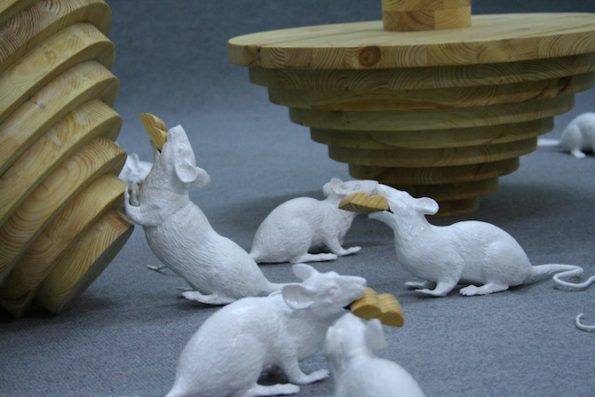Search
To search for an exact match, type the word or phrase you want in quotation marks.
A*DESK has been offering since 2002 contents about criticism and contemporary art. A*DESK has become consolidated thanks to all those who have believed in the project, all those who have followed us, debating, participating and collaborating. Many people have collaborated with A*DESK, and continue to do so. Their efforts, knowledge and belief in the project are what make it grow internationally. At A*DESK we have also generated work for over one hundred professionals in culture, from small collaborations with reviews and classes, to more prolonged and intense collaborations.
At A*DESK we believe in the need for free and universal access to culture and knowledge. We want to carry on being independent, remaining open to more ideas and opinions. If you believe in A*DESK, we need your backing to be able to continue. You can now participate in the project by supporting it. You can choose how much you want to contribute to the project.
You can decide how much you want to bring to the project.

“In memoriam”. Systemic representations in the era of financial feudalism
On the 04/11/2011 Nicolas Sarkozy declared at the G20 summit in Cannes: “We don’t want any more tax havens, and the countries that still covertly continue to be tax havens will be shunned by the international community”. On 27/09/2011 Alessio Rastani, a broker in the City of London, in a polemical declaration stated: “I go to bed every night and dream of another recession”, alluding to the fact that the crisis is an ideal opportunity to make money on the financial markets. On 01/05/2012 Ignacio Ramonet, on the television programme Singulars, accused Mario Draghi, previously director of the World Bank and currently president of the European Central Bank, of setting in motion an explicit policy to dismantle the welfare state. On 07/12/2012 Laurent Fabius, French Minister of Foreign Affairs, said at the Summit of Doha about climate change: “If planet earth could speak, its message would be today: Mayday, mayday, mayday”. On 30/01/2013 José Luis Bárcenas made public a book of accounts revealing a supposed B accounting, with cash payments to members of the upper echelons of the PP stemming from anonymous donations to the party. On 15/12/2012, Àngel Pomerol presented his work “In Memoriam”, winner of the 36 Julio Antonio Prize for sculpture in the Biennial of Art, of the Diputación of Tarragona, at the Museo de Arte Moderno in Tarragona.
A notion of the system envisages a series of interconnected elements with dynamic functions and processes in constant indeterminacy. In comparison to the rundown vision of a universe governed by order and the arithmetic of the spheres, the representation of the physical and symbolical world that surrounds us tends increasingly towards notions contaminated more by chaos, complexity and ambivalence.
Despite this, it seems that the block of the Apollonian impulse, the desire to understand and attribute a reasonable order to the world, continues to numb our perception of reality: we continue to attribute omnipotent powers to mechanisms that permit the squaring of the circle and return to order what due to unknown circumstances seems inopportunely disordered. The idea of a magnanimous clockwork mechanism persists in our cultural makeup. Thousands of cogs that fit to perfection, turning and turning in harmony, that amaze and fascinate our capacity for abstraction. The system seems to function, except for a few incidences, consequences or some collateral damage. Agents, institutions, organisations, systems of behaviour, beliefs, norms, attitudes and values confabulate to lead us along the path of progress and emancipation. The world, apparently, is a habitable and governed place.
Critical theory: Marxist, nihilist, apocalyptic, post-structuralist and ecological, has endeavoured to put an end to this naïve vision of the world and the universe. We have powerful arguments, broad and baroque rhetoric, historic facts and rigorous testimonies that certify this discourse, often branded as anti-modern, where conflict and disequilibrium are the core axes of the system. However, I have the sensation that we rarely allow ourselves to have the idea that the systemic collapse can be foreseen two or three generations ahead. We need to think that one day the crisis will pass and we will once again be able to reach the end of the month. Progress, technology, experts, the competent authorities, human intelligence, that gratifying cup of coffee at 10:30, …there are so many powerful arguments that accommodate us. It’s a question of winding up the watch, getting rid of the dust, a bit of oil and everything, everything will return to its place. We will have lived and the cogs will continue to grind without us.
“In memoriam”, are three spinning tops, geometric revolutionary figures as Pomerol calls them, that don’t spin. Still, inert, lying on the floor. They don’t spin, but it seems as if in their time they did. They also look more like motorised elements than spinning tops. Elements, perhaps, from a system? Surrounded by rats that devour them. They nibble away at them, perforating the edges, giving the impression that they cause the indentations of the cogwheels. The rats around the space display their ostentatious spoils. The analysis is served with all the risk and excessive force that the piece hit me with from the very first moment I saw it. The sensation was univocal someone had understood how to represent, intelligently, a contemporary revision of the systemic logic of financial feudalism.

Blai has been dubious for years between the Punk vein and the Social Democrat. He thinks that good ideas and good manners are the pillars of Civilization, but too often subordinate news shows that vulgarity and banality are dominant. He says that now that we are in the Second Democratic Transition and in a global context of systemic crisis, perhaps I felt the time to sharpen the ridge.
"A desk is a dangerous place from which to watch the world" (John Le Carré)